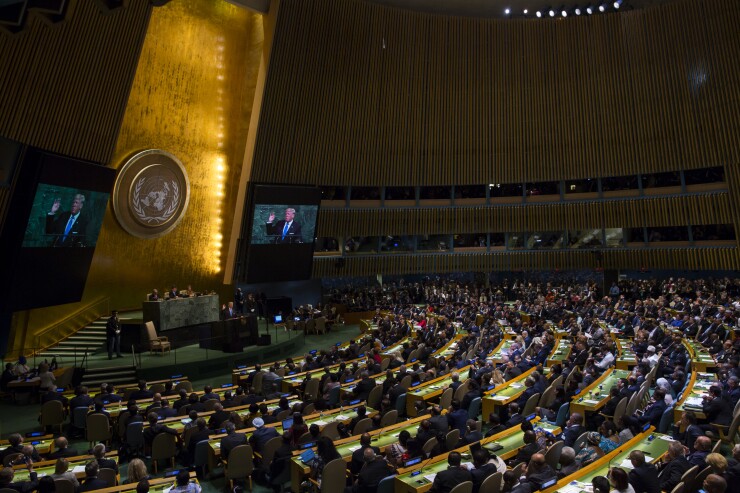With the World Bank-International Monetary Fund annual meetings this week occurring just after the U.N. General Assembly, international development advocates have been pressing for a dramatic increase in private-sector investment to improve the quality of life in emerging and developing nations.
The
What both constituencies need to realize is that a comprehensive development strategy — as proposed in the SDGs — and global financial stability are inextricably linked.

U.N. Secretary-General Antonio Guterres
There’s no question that the financial system can do a lot more to cover the tab. At the end of 2016, the world’s five largest banks alone held more than $14 trillion in assets. And every year, banks package and sell $13 trillion in new debt and equity securities to institutional investors. By contrast, investment in sustainable development projects from all sources was only $1.4 trillion, according to a World Economic Forum estimate.
Development organizations must strengthen the loan guarantees used to attract banks to riskier projects. To further this effort, regulators should modify Basel III rules so that banks can invest more in development projects that, while risky, promise to improve the quality of life and increase stability in developing countries.
Used wisely, loan guarantees have a multiplier effect. Development organizations that provide guarantees can facilitate backing with a small amount of cash relative to the size of the project. In fact, some guarantee programs have reported achieving financing power that is five to 25 times the amount of the investment over time.
Applying that kind of ratio to the $152 billion spent on aid by members of the Organization for Economic Co-operation and Development (OECD) makes bridging the SDG funding gap start to appear feasible.
Yet, only 5% of multilateral donor budgets go toward guarantees. Increasing that level requires needed steps from both development organizations and government policymakers.
Under OECD guidelines, targets for foreign assistance budgets are measured on the basis of money spent rather than on the impact of an investment. This creates a bias toward direct-funding solutions, such as grants and concessionary loans that are simpler to execute, rather than guarantees. Although the OECD is working to correct this, for the time being, giving money away is the primary approach for its members.
Meanwhile, development stakeholders also must come up with better guidelines for what triggers a guarantee and how a bank’s claim is redeemed. Organizations that provide guarantees can help banks stay within Basel’s required minimum reserve and liquidity ratios by eliminating requirements that create uncertainty or force banks to pursue borrowers in the event of a default. Frankly, banks want to be assured that they will be paid back on time. Because the market for guarantees is nascent, there are no clearly defined best-practice standards that might offer such assurances.
We have seen firsthand banks’ aversion to inefficient guarantee structures. Before joining the Milken Institute, we attempted to negotiate a $100 million financing agreement for the
Changes in the regulatory framework and other areas can incentivize banks to play a bigger role. First, guarantee language should be standardized to maximize the value and certainty of payment. Second, G20 guarantee commitments should count toward OECD targets. Lastly, regulators should reform Basel to exempt guarantees provided by AAA-rated governments from the paid-in capital test or to classify guarantees as “high-quality liquid assets.”
Surely, large global banks can play a bigger role in advancing global development goals without there being trade-offs in financial market stability.
Now is the time to act. Opening a dialogue between separate and distinct stakeholders in development funding is a critical first step. Let’s remember that the governments that created the SDGs also influence the regulations that have a critical role in whether the development goals are achieved. The continued dissonance between the rules banks follow and those that guide development organizations can have serious, unintended consequences for people in developing nations.
Let’s elevate our thinking by adopting a more systems-based, results-oriented approach and clearing the way for private-sector players to help spread prosperity throughout the world.





